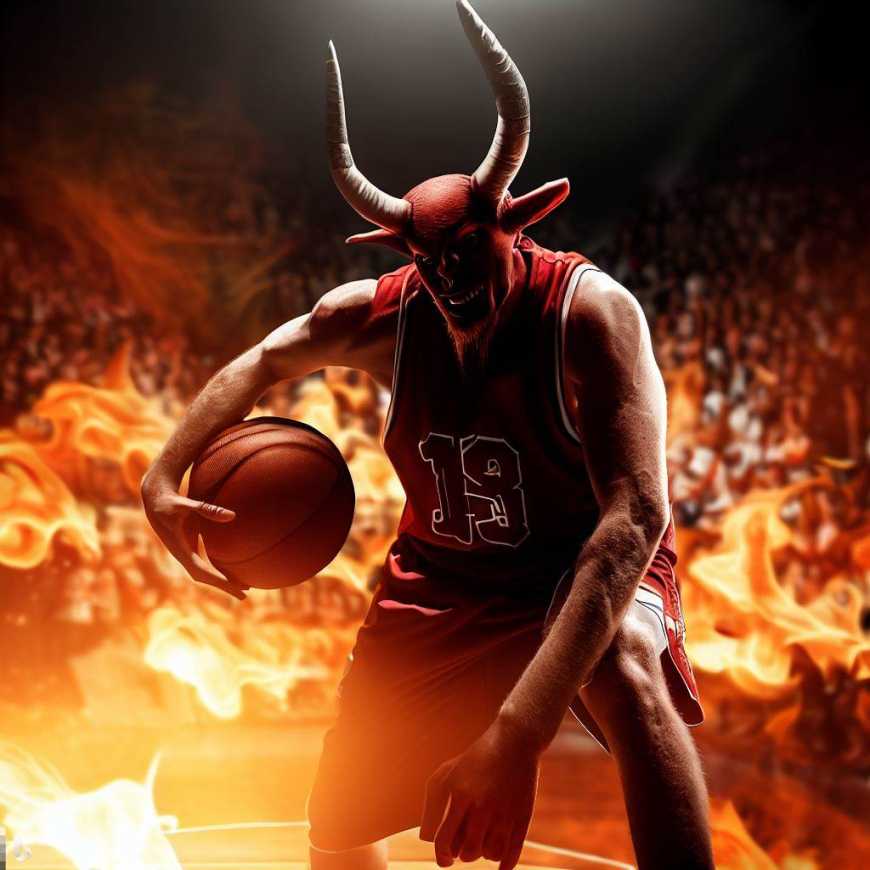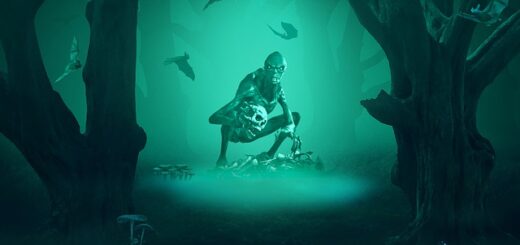The Last Confession of a College Basketball Coach by Dan Plagens

The Last Confession of a College Basketball Coach
by Dan Plagens
Bless me, Father, for I have sinned. It has been four or five seasons since my last confession. I’m the head coach of the Detroit University Wildcats now. I know you’re all knowing and all powerful, but even you might not have heard of them. They’re an insignificant commuter school in the insignificant Great Lakes Conference. Barely even in D-I, if we’re being honest, but I’ve taken them to the Final Four for the first time in their history, far deeper into the tournament than anybody in Vegas would have given you odds on. I wish I could take some of the credit. I wish I could give you some of the credit. But the truth is, Father, I have to give the man downstairs his due. I hired him as one of my assistant coaches.
You have to understand that I didn’t know who he was at the time. I thought he was just another basketball coach. He had a great resume: Syracuse, Kentucky, Louisville, the NBA, the EuroLeague. He was well known in my profession and was getting on in years, but he could still have had any job he wanted. Sure, I didn’t understand why he reached out to me about the associate head coach opening. It wasn’t a step down for him as much as a whole flight of stairs. He told me he wanted to be someone’s number two as they built something from nothing and, like an idiot, I believed him. He didn’t ask much of me at first, when we started working together. He wanted me to raise my voice more with the kids, be less kind with them, and be more of a boss and less of a cheerleader. I couldn’t say any of that was bad advice. He also encouraged me to stay later and later at the office. To put my soul into my work. I saw my wife and daughter less, but I didn’t see them much during the season anyway.
I’m embarrassed by how long it took me to realize who he was, Father. It’s not like there weren’t signs in the offseason. I noticed more flies than usual buzzing around the practice facility. But I’d thought someone had just left a window open and the bugs had nested. We started to smell something faint but rancid in the walls. I thought it was mold, but the university’s building engineer couldn’t find any. Then my players started to complain that when they were alone in the facility, spending a late night studying film, practicing free throws, or lifting weights, they could hear a chorus of whispers in the halls. I dismissed them, saying they probably just left their headphones on and didn’t realize it.
Coach Lucifer—that isn’t the name he goes by in basketball circles but it’s what I’ve taken to calling him—walked into my office one day very, very excited. He told me he’d been talking to a former five-star recruit whose family he knew. I recognized the name immediately. Anyone who paid attention to basketball knew him. A forward originally from Flint who had it all: size, speed, defense, shooting from beyond and inside the arc. You name it, it was part of his game. And after alienating the locker room at a national powerhouse down south by giving one too many of his teammates the cold shoulder, he was likely to transfer somewhere closer to home. That whole university wanted him gone. He wasn’t a great student, he alienated everyone he met, and the fact he brought a nine millimeter handgun to class—he didn’t use it and he was technically permitted to have it, but someone saw it in his beltline when he bent over to pick up a dropped pencil—didn’t help him much.
He seemed like trouble on paper. Too much trouble for another school of that caliber to take a flyer on him. But what was I, the basketball equivalent of a pauper, supposed to do? Say no to five-star talent? No in this world. I told Coach Lucifer to set up a home visit. The first thing you notice when you meet the kid is his eyes. They carry a resentment of the world and all of your creations. Can’t say I blamed him for thinking that way, Father. He had enough trauma in his life that he radiated darkness and intensity. Dead relatives, absent relatives, relatives you wish were dead or absent. He lived the type of life you wouldn’t wish on any kid even if he pissed on your shoes and shit in your yard—pardon the language. Someone needed to give him a break.
And I couldn’t say I didn’t admire the way he took all that rage and put it into his game. He tended to get into foul trouble, sure, and when I watched his tape, I could see he didn’t pass the rock much. But I fancied myself a teambuilder. I could get him to work with the guards and the one big I had on the roster. That’s what I told him. Coach Lucifer, for his part, gave the most quietly impassioned recruiting pitch I’d ever heard. The NBA would come calling, he assured the kid, he just needed to be a big fish in a small pond for a little while.
The kid signed with us shortly afterward, and he averaged thirty points a game after our first eight. He became the whole offense and defense. He was the number one scoring option and our go to guy if we needed to shut somebody down. He could lockdown the slipperiest of guards or the biggest, trolliest-looking bigs in our league. That wasn’t saying much, I suppose. The tallest center in the Great Lakes Conference was six-foot-eight if the tape measure was generous. The real test would come in games nine and ten, when we played national powers in what were called body bag games. The etymology there’s pretty clear, isn’t it, Lord? The other guys were supposed to beat the crap out of us and while we licked our wounds their flush with cash athletic department would cut us a nice check.
The first body bag game was in an NBA arena, and the loss was the first of our campaign. The kid helped us keep it close, but the opposition pulled away with two minutes left. In the locker room afterward, I told everyone I was proud of their effort. Nobody could tell us that we didn’t give it all we had. They could hold their heads high.
Sitting in the bus after the game, Coach Lucifer whispered angrily in my ear. He ordered me to never give a speech like that again. I needed to stuff the saccharine shit back up my ass, he said, then asked me if I was capable of feeling humiliation. If I had a competitive bone in my body. Defeat didn’t just need to sting, it needed to singe, he said. It needed to burn. You should taste bitterness in every bite you ate for a week after a loss like that. A part of me thought I could glimpse it behind the color in his eyes, the truth of what he was then. But I tossed the thought aside as irrational. An intrusive thought. The byproduct of a dozen years of Catholic school. I reminded him who was in charge and put the game behind me. We were onto the next one.
It was on the campus of an out-of-state flagship university. The team was at the top of the AP and Coach’s polls, as per usual. They were a powerhouse. The bluest of blue bloods. The program was approached by everyone in this profession with reverence. Their arena was ancient but had too much history to be replaced or remodeled. And the crowd was raucous, even at twelve on a Sunday afternoon for a game that was only being broadcast regionally on a network that—I don’t mean to question your wisdom, Father, but on a network that I didn’t entirely see a purpose for existing.
At any rate, the game was close. The kid played great, and he was elevating the guys around him. We milked the clock, taking as much time off the shot clock as possible before shooting to minimize the total number of possessions, and Coach Lucifer had some great ideas for defensive adjustments. He found a way to mix in man with zone defense. Very clever stuff. Essentially the football concept of pattern match zone but for basketball. I won’t bore you with the details, Father, but I’m sure you’d be impressed. The upshot was this: it was tied going into the half.
I have a speech I like to use in close games. I focus on all the things my players are doing well and encourage them to keep going. It’s tepid, I know. But it’s worked for me. Over the course of my twenty-years as a head coach in basketball, I’d only lost sixty percent of games tied or within five-points at half. Coach Lucifer had other ideas. He gave me a notecard before we got into the locker room with bullet points on what he wanted me to say. It was rancid. Full of profanities the likes of which I had never dared utter in my life. I said absolutely not. He told me he was going to give the speech himself, then, and went in before I could stop him.
The speech he gave, Father, I can’t remember any of it. Neither can any of my players. Not the specifics, anyway. The only thing anyone can recall is the intensity. He wanted us to go out and attack and attack and attack until we saw their blood on the floor. His aggression motivated, angered, made you believe. We all saw red. The other guys, this national powerhouse that should have ripped us asunder, they didn’t stand a chance in that second twenty minute period. We suffocated them. Our elbows met their faces. We eviscerated them on offense, cut through their zones and bombed them from afar. It was an embarrassment. And when they got back to their locker room after their drumming, they found a cloud of fruit flies coming in through the vents.
The kid led the way with a triple-double, and thanks to him the Detroit University Wildcats were a talking point on the national stage for a week. But it was all going to come crashing down.
A few nights later, the night after Christmas in fact, one of the few nights that season that I crawled into bed with my wife before she’d fallen asleep, my phone rang. It was one of our boosters, the captain of a Police Precinct. He said that the kid was in custody. He was cagey about details on the phone, afraid someone would overhear. He whispered and it was hard to make out. Something about a girl. It didn’t sound good.
Coach Lucifer beat me to the precinct. He was berating the desk sergeant, then turned when he saw me come in. He told me we didn’t have anything to worry about. This was all a big misunderstanding. They were going to release the kid before sunrise. There was nothing they could make stick. There was nothing to charge him with.
These were the facts: a young woman from one of the kid’s classes was in his dorm room earlier that night, she left after a long simmering argument about her relationship with another man, and now she had two bullet holes in her head courtesy of a nine millimeter handgun. The same kind of gun he was caught with on campus at his last school. The kid claimed he didn’t have the gun anymore. Someone stole it. He didn’t want to shoot the girl. He loved her. And even if he did want to kill her, he argued, he didn’t have the means to. And this was true. He had reported the gun missing. The only thing the cops had on the kid was that he didn’t have an alibi for early in the morning, when the shooting at the girl’s home took place. He said he was at home studying film, but there were no witnesses to testify to this.
The kid didn’t want to go back to his dorm when they released him. Classmates saw him get escorted out in handcuffs by the police. Coach Lucifer volunteered to let him stay at his place for the night, and promised that we’d see in the morning if there was a way to pull strings with the university administration and get him moved to a different building, somewhere more private. While we were standing in the parking lot, Coach Lucifer told the kid to go wait in the car. Coaches needed to have a heart-to-heart.
When we were alone, the night air grew warmer. I heard whispering in a language I recognized from my school days but could never quite speak. Then Coach Lucifer’s eyes gleamed red for the briefest of moments. I thought it was my imagination, I really thought it was, but then he said to me: “you realize what I am, don’t you?”
And I nodded.
He told me that nothing that had happened that night mattered. He could make it go away; we could press on with the season and it wouldn’t cost me anything. It wasn’t my soul he was interested in.
“Your soul is of no practical use to anyone,” he told me, then instructed meto stay quiet. To never speak a word of this to anyone. To not speculate. To never, under any circumstances, ask the kid what happened that night.
So I didn’t. I kept my mouth shut when the reporters started calling and the thinkpieces started to roll in. When the university president called for a personal briefing, I let Coach Lucifer do the talking. On the advice of counsel—which Coach Lucifer arranged for—the kid issued one statement to the press denying any involvement in the shooting, and iterating how this was just another heartbreaking loss in his life. He never wanted any of this. All he longed for was to be on the basketball court.
This did not play well with people on the internet. They wanted his head. They did not know if he was responsible for her death, but they felt that he killed that girl deep down in their hearts, so they also felt justified in posting heinous things about him. They wanted to see him languish in a cell for the rest of his life. They wanted him to drop the soap in the shower. They wanted him torn apart from the inside. They said they wanted accountability, but it seemed to me they just wanted all of these unspeakable things to happen to him. They didn’t need any more evidence than a speculated motive to render him guilty and wish torture upon him.
The more level-headed just wanted him suspended and Coach Lucifer asked what they wanted him suspended for. Knowing the wrong person at the wrong time? As far as he was concerned, there was nothing but happenstance tying the kid to the shooting.
And that’s what I’ve been telling myself for months now. It echoes in my skull even now. This was all just a terrible coincidence. This was all just a terrible coincidence. I tell myself that over and over and over again, and each time I do, it’s with less and less conviction. My wife told me that where there is smoke there is fire. I tell her that’s fine and all but who lit the kindling, then she asks me what that’s supposed to mean and I go sleep on the couch.
What would you have me do, Father? I can’t conjure the truth before me. I can’t know what to believe. That’s why I’ve been coming back to church, in the hope that you would provide me with an answer to make this all make sense. Why would you let this girl die? I’ve been reading about her. She seemed so kind. She volunteered at a soup kitchen on holidays. Was going to be a nurse. The first in her family to go to college. She had a future, is what I’m trying to say.
The kid did too. Still does, I suppose. The NBA is interested in him. They say he might be a top three pick. We’ve been the world’s least likable underdogs for months now, but he led us through the tournament and brought us to the brink of greatness. Him and Coach Lucifer. I’ve seen the way the kid looks away when Coach Lucifer glances at him. The shame and the fear are palpable. The kid killed her and Coach Lucifer is protecting him. That’s the only explanation I can fathom. I don’t want it to be true so I pretend that it is not. I pretend that there is no credence at all to what the digital peanut gallery says about the kid. I pretend that there is smoke but no fire.
I just don’t understand why the kid matters to him so much. Is that something you can explain to me, Father? Is there some kind of cosmic basketball game that’s going to be held during the end of days between the kingdom of heaven and the forces of hell? Is it single elimination thing or best of seven? I didn’t always pay attention during Sunday school.
You probably think I’m crazy. Maybe I am. It would make all of this easier to swallow. The kid, Coach Lucifer, and I, we’re about to make basketball history. And all I have is a guilty conscience. But tell me, Father–you, the man in the confessional booth with me, not the God who has let all of this happen–who am I supposed to turn to for help when I am party to a great evil equipped with power beyond my comprehension? I’m realizing that there’s nothing up there. That we are on our own. But I don’t know how to live in a world where devils are real but angels are not. I used to think I wanted a championship ring, but now I realize all I’ve wanted is to feel like there’s something more to this Earth than degeneration and wickedness, and I deluded myself into believing that I could find that deliverance though God or sport or my fellow man. But I can’t. Because there is no deliverance or salvation. We’re just here for the ride. And the only ultimate truth on God’s green earth is this: I’m doing nothing more right now than speaking to a man in a wooden box.
Anyway. I guess that’s all I have to say, Josh. Thanks for your time. There are two tickets at the box office tonight in your name. Hope you have a good time. Go Wildcats.
* * * * THE END * * * *
Copyright Dan Plagens 2023



